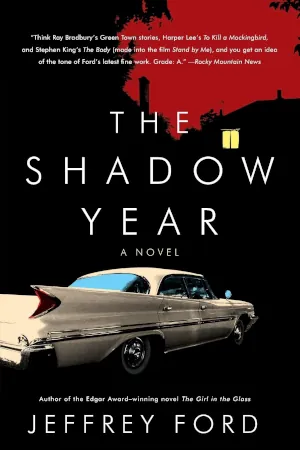
Top 100 Fantasy Books Of All Time
Looking for great fantasy books? Take a look at the 100 pages we rate highest

The Shadow Year is not a science fiction novel. Neither is it a fantasy novel.
What is it? Well, if that question means ‘what category does it fall into?’, my answer is: you got me. Don’t know. If the question is meant to be more general, as in ‘how is it?’ or ‘do it fly?’ then my answer is unequivocally ‘yes.’
This novel, wherever it lays its elusive head, reminds me of a saying some baseball announcers have about only a handful of major league pitchers. When a guy throws 100 mph but looks like he’s soft-tossing raw eggs into a bucket of cotton candy with all the care of a sleeping man fishing without a rod, he’s throwing easy gas. Jeffrey Ford throws genuine easy gas with this little semi-autobiographical gem. The book pulls you in, keeps pulling you, yanking you, in fact, but you never feel anything but a slight trace of a tug. So familiar is he with his world – the south shore of western Suffolk County (NY) in the late sixties (thanks for the Munson rookie reference, J.F.) -- and so skilled is he at drawing you into it, that you scarcely notice the creepy, dark water leaking in under your mental door.
How can I place you in the book without giving away the plot, and how can I give it its due? Only a thorough read will reward those interested and daring enough, but don’t expect Tolkien or Asimov. The emotional palette Ford invokes is more that of Louise Glűck’s poem “Gretel in Darkness” – things, especially familiar, available things, are not what they have been, not during this particular year. Something dark is cooking dinner. The ingredients: summer swarms, tricky deaths and disappearances, psychic hiccups, a weird mock town straight out of “Beetlejuice”, a touch of “Rainman” (or “Pi” if you prefer) and lotsa sherry-infused, houndishly ambiguous moments. And eyes. Think “Stand by Me” meets the Lovely Bones meets Dom DeLillo (whose fantastic phrase “Who will die first?” from White Noise kept echoing in my head as I marvelled at Ford’s easy gas).
What the Shadow Year has that King and Sebold don’t in their tales is a rich, enveloping sense of subtext. And for me, who has long since fled screaming from Shea and his Shannarigans in search of an author’s mind at work, subtext is king. For many, there will be references that fly over head and crown. Roll with them anyway. For those of us…uh…lucky enough to have grown up on Long Island in the late sixties and early seventies, the presence of such nuggets as Mister Softee, Chiller Theater, the 4:30 movie and a deep fear of Halloween apples and Nair bombs provides an extra, magically delicious subtextual payoff. Krapp’s moon shines brightly in some form or fashion in all our ripening minds, n’est pas?
I don’t know what category Jeffrey Ford’s novel falls into, but I’m fairly certain he doesn’t care, and readers shouldn’t either, because this is a damned good read. Enjoy.
Review by Jim Eaton
8.8/10 from 1 reviews

Looking for great fantasy books? Take a look at the 100 pages we rate highest

There's nothing better than finding a fantasy series you can lose yourself in

Our fantasy books of the year, from 2006 to 2021